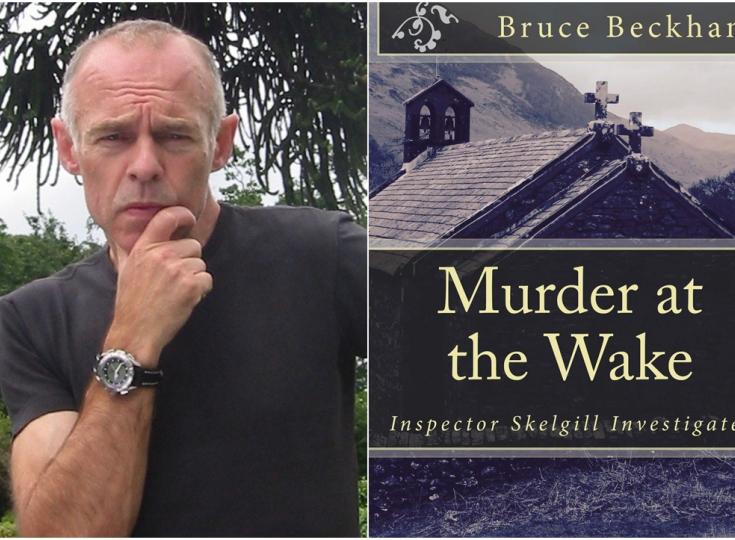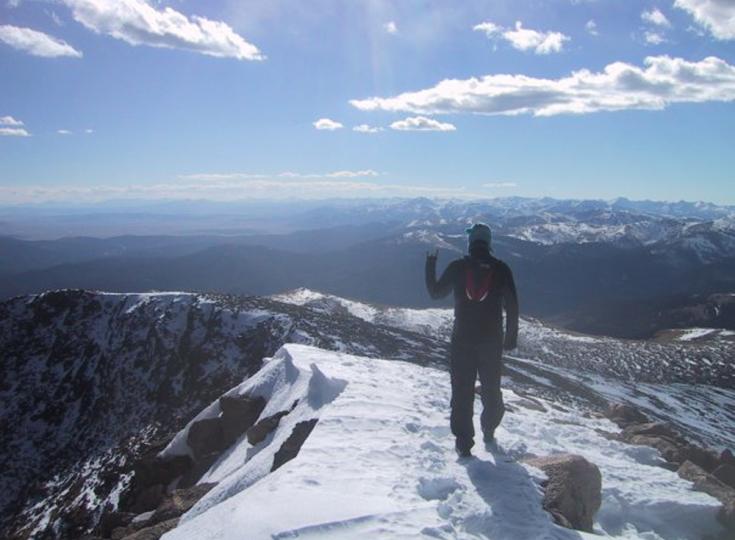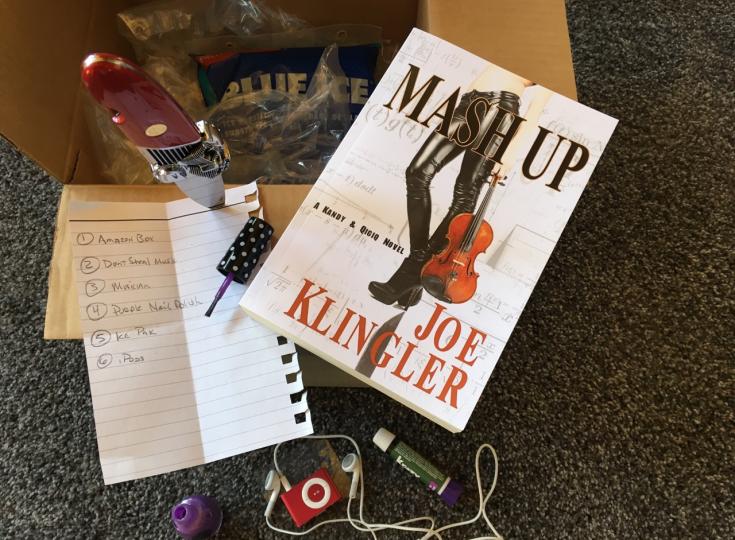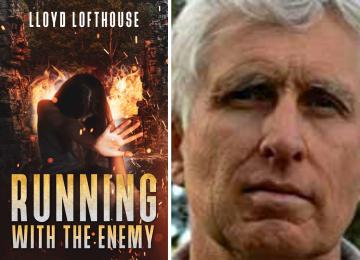Bruce Beckham - Crime Mysteries with Sinister Twists

True to British tradition, Bruce Beckham grew up consuming detective stories in all forms (print, film and tv). In the author's own words, "becoming involved in it seems as natural as playing football." Much to the delight of his fans, Beckham weaves interesting murder mysteries in which you never know what to expect. As our Author of the Day, Beckham talks about Charles Dickens, the English Lake District and reveals why his books are so unpredictable.
Please give us a short introduction to what Murder at the Wake is about.
Murder at the Wake takes place largely in the beautiful Vale of Lorton, where the lakes of Buttermere and Crummock Water lie, and at ‘Crummock Hall’, the ancestral home of the originally Irish O’More family. Through an earlier tragedy, inheritance has skipped a generation – but when the time comes (and it does so as the result of a murder) those grandchildren who stand to benefit all appear to have forged successful and lucrative careers. Why would anyone bump off Great Uncle Declan?
What inspired you to use a family feud and much-coveted inheritance as themes in your book?
Actually I wanted to write a version of the famous ‘locked room’ mystery – so the notion of a wealthy family trapped in their snowbound mansion came as a secondary idea, predicated by the overall Lake District setting. Of course, an element of what I do is to write traditional-style mysteries in a contemporary environment, so my apologies for the occasionally clichéd theme! Some of the other books concern more modern controversies.
This is book 7 in the series – can it be read as a standalone? How does it tie in with the other books in the series?
Yes – all of the books – currently 10 – can be read as standalones. I’m humbled that someone will read ONE of my books – I don’t dare write in such a way that requires more dedication and commitment on behalf of the reader!
Some reviewers comment that it is best to read the series in order – but it is certainly not necessary. There is inevitably a small chronological progression, but in broad terms the characters move with the times rather like Dr Who. I understand one of Agatha Christie’s great regrets was allowing Poirot to age – it has been calculated that he was something like 147 years old in the final novel!
What makes the English Lake District such an enchanting place for your mysteries?
Well, of course it is a stunningly beautiful part of the world – and I say that as an “offcomer” as the locals call outsiders. But it is also a real living, working community, where hardy farming folk have laboured for centuries. Today there are well-heeled settlers, underprivileged indigenous communities in the former industrial coastal towns, and thousands of enthusiastic leisure providers – overlay that with 17 million visitors a year, and the Lakes is quite a melting pot.
Tell us more about Daniel Skelgill – what makes him tick?
Skelgill is an enigma and I think I understand him less well as time goes on! I don’t know too much about his backstory – just what little is written in the books. This might sound strange, but I just report on what I ‘see’ – what comes to me each morning – I don’t try to force something upon him or any of the other characters. He was conceived as an amalgam of – maybe – three people whom I had known (all rather difficult sorts, in their own ways, and idiosyncratic) – and I suppose the final quarter of his personality must be somewhat autobiographical. My wife would probably highlight the capriciousness and recalcitrance – although I would say we’re both left-handed and love fishing!
Besides writing, what other secret skills do you have?
My main skill and primary profession until recently was advertising. I formed my own company, eventually sold this, moved into consultancy, training and marketing writing – and ended up lecturing in many parts of the world – from Mexico in the west to Shanghai in the east.
I have numerous hobbies that I don’t have enough time for – but my first love (even above fishing) is bird watching – I’ve been fanatical since boyhood, and nowadays I take guided walks on the reserve beside my house for a local charity.
Readers commented that your novels remind them a bit of the work of Charles Dickens. Are you a Dickens fan?
My answer to ‘what is your favourite book of all time?’ is usually A Tale Of Two Cities – so that is probably all you need to know. I have all of Dickens’ works on my shelves. A genius of the greatest order, with whom I cannot remotely be compared. I hope I write a bit more economically than him, however!
Fly fishing plays an important role in this book. Why did you take up this approach?
In this particular story it happened naturally – as events (past and present) began to unravel, it became clear that the nearby lakes of Buttermere and Crummock Water were coming increasingly into play – and of course Skelgill’s inherent interest in angling made it something that attracted his attention.
Do you have any interesting writing habits? Favorite writing spot, time of day to write?
I am super-habitual! It’s the only way to produce a new book every six months. (1) I get up at 6am every day (365), make tea and start writing. Typically I am in the middle of a novel – so I just bash down whatever I see and hear happening in the current scene – no attempt at good grammar – just the ideas, rough conversations etc. I have to write about 400 words a day. I stop at about 7.30am to get my youngest daughter ready for school. (2) At 8.30 I drop in at the gym on the way back from the school run. After an hour’s exercise if I’m lucky some ‘big ideas’ (twists, connections) will come to me while I’m recovering in the sauna/jacuzzi – it is a process of both developing and solving the crime. These thoughts usually end up being scribbled on soggy paper towels! (3) At 11am I take my dog out. I’m lucky to live literally beside a 200-acre nature reserve. I have a few ‘secret’ quiet spots. I take with me printouts of the writing from a few days earlier (this morning’s is too rough yet). I read over, find errors, disconnects, repetition etc – I just mark in red – I don’t try to improve at this stage. I will go over each piece up to 10 times (ie. for 10 days) until the red marks stop appearing. It helps me craft the copy and also fashion the broader story. Usually I eat lunch under one of my trees. (Patient dog gets crusts.) (4) Next main job is the supermarket – tonight’s dinner. In the café I get out my Mac and update all the red marks into the master text. School run, dinner, hockey etc. (5) Later in the evening when I feel sufficiently recovered I spend some time improving and making sense of the text I wrote fresh this morning.
So – you can see the process is not linear or chronological – and I work in bursts. I have settled on different times and places for different tasks – there are 5 distinct stages described above: (1) new words; (2) ideas; (3) sense-checking; (4) re-fashioning; (5) copy editing.
Why murder mysteries? What drew you to the genre?
I have loved Agatha Christie stories for as long as I can remember – but it must have been in teen age that I discovered them. I think the sense of nostalgia initially appealed to me as much as anything. There is such a strong tradition in Britain of detective stories, in print and film/tv – that to become involved in it seems as natural as playing football.
One aside in this regard. Before I wrote the first Skelgill novel I heard British author and broadcaster Melvin Bragg (now Lord Bragg) speaking of how he had tried to write a whodunit – thinking it would be easy – and found it impossible. This stuck in my mind as a challenge.
I have also loved crosswords since a young age – and around the 20-mark a girlfriend taught me how to do cryptic crosswords – you’re probably thinking, ‘unusual girlfriend’! However, as my career in advertising developed, I recognised the similarity in solving a cryptic clue and cracking an advertising brief – they are both non-linear and require complex thinking (in fact ‘feeling’ at the subconscious level). Using this same technique I put my mysteries together by just allowing them to develop.
So– the main way that I keep my readers in the dark... is by keeping myself in the dark! The very first book, I did try to plan – but I soon discovered it was far better (and more enjoyable) to let the crime happen, follow the detectives as they investigate the circumstances and suspects – and ... eureka!... eventually it all becomes clear. But I rarely know ‘whodunit’ before halfway.
How much have your travels around the world influenced your writing?
Actually not as much as I would like. Occasionally Skelgill needs to jet off somewhere to follow a suspect or a lead (so I pick somewhere I have visited – examples in the books include Singapore, Kiev, Dublin), but on the whole the series is UK based. I’ve toyed with the idea of sending him on an exotic holiday where he finds himself wrapped up in a murder – but, given a week off, Skelgill would certainly choose fishing on Bassenthwaite Lake! I’d say the main thing I’ve gained from my travels in the context of reading/writing is an appreciation of just how alike we all are.
What are you working on right now?
Book #11 in the Skelgill series – it’s called Murder Mystery Weekend – a well-to-do party of friends stay in a castle where part of the package is a murder mystery evening. You can guess what happens next!
Where can our readers discover more of your work or interact with you?
Probably best is via Goodreads – just find my author page and send me a message. I will reply. Alternatively I have an author page on Amazon.
These are the links:
https://www.goodreads.com/author/show/6916662.Bruce_Beckham
https://www.amazon.com/Bruce-Beckham/e/B00AX4LFUC/ref=sr_ntt_srch_lnk_1?qid=1518795634&sr=8-1






